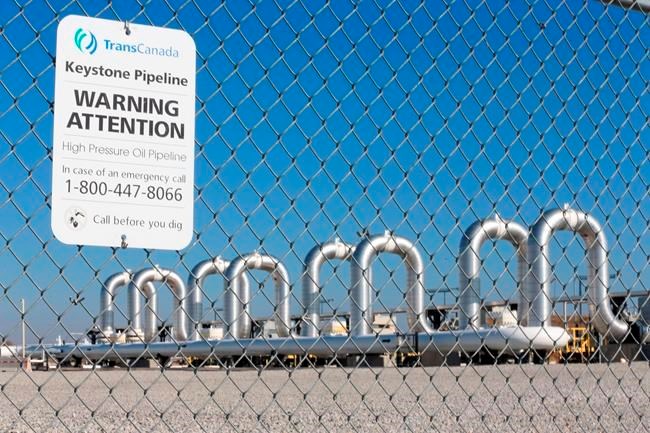CALGARY — TC Energy Corp. is reporting a first-quarter net loss of $1.1 billion after taking a $2.2-billion after-tax asset impairment charge on its cancelled Keystone XL export oil pipeline.
The charge is net of expected cash recoveries from contracted shippers and a sale of recoverable pipeline assets, but will eventually be further reduced by recoveries from the government of Alberta's investment and loan guarantees for the project, the Calgary-based company said.
"On Keystone, we were very disappointed with the decision in January to revoke the presidential permit," said CEO François Poirier on a conference call to discuss first-quarter results on Friday.
"As a result of the decision, we subsequently agreed with our partner, the government of Alberta, to formally suspend the project and evaluated our investment for impairment ... These costs will be shared with our partner, thereby reducing our net financial exposure at March 31 to approximately $1 billion."
TC Energy said the charge includes impairment of related projects in development such as the Heartland Pipeline, TC Terminals and the Keystone Hardisty Terminal.
The Keystone XL expansion to an existing pipeline network would have increased Canadian oil export capacity by up to 830,000 barrels a day. It was suspended after newly elected U.S. President Joe Biden fulfilled a campaign promise to cancel its presidential permit.
TC Energy decided to start construction of Keystone XL in March 2020 after the Alberta government agreed to take a $1.5 billion equity stake and provide a $6 billion loan guarantee to ensure work started immediately.
In recent quarterly results reports, shippers including Cenovus Energy Inc., Suncor Energy Inc. and Imperial Oil Ltd. have reported writedowns on earnings related to their commitments to Keystone XL.
TC Energy's impairment charge was reduced by about $700 million in expected recoveries from shippers and a couple of hundred million dollars expected from sale of Keystone XL assets, said chief financial officer Don Marchant on the call, adding project wind-down costs are about $500 million.
Poirier welcomed as "a step in the right direction" the recent commitment by the Canadian government to offer tax incentives to encourage carbon capture usage and storage programs.
"The energy mix of the future will evolve with renewables, for example, making up a greater portion of the fuel mix," he said.
"Our goal is to build on our long history of success and be agnostic to which form of energy will ultimately lead to a lower-carbon energy future."
TC Energy recently launched a call for proposals to supply 620 megawatts of wind power to meet the electricity needs for a portion of its U.S. pipeline assets along its U.S. corridor.
It plans to launch a process to line up solar power suppliers as well later this month, said Corey Hessen, president of power and storage.
In its quarterly report, TC Energy said comparable earnings without the Keystone XL writedown were $1.108 billion or $1.16 per share, down from $1.109 billion or $1.18 per share in the year-earlier period.
It says revenue was $3.38 billion, down from $3.42 billion in the first quarter of 2020.
This report by The Canadian Press was first published May 7, 2021.
Companies in this story: (TSX:TRP)
Dan Healing, The Canadian Press




